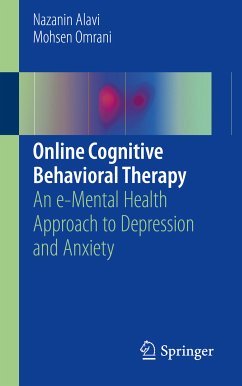
Digital Mental Health (eBook, PDF)
A Practitioner's Guide
Redaktion: Passos, Ives Cavalcante; Kapczinski, Flavio; Rabelo-Da-Ponte, Francisco Diego
Versandkostenfrei!
Sofort per Download lieferbar
72,95 €
inkl. MwSt.
Weitere Ausgaben:

PAYBACK Punkte
36 °P sammeln!
This innovative book focuses on potential, limitations, and recommendations for the digital mental health landscape. Authors synthesize existing literature on the validity of digital health technologies, including smartphones apps, sensors, chatbots and telepsychiatry for mental health disorders. They also note that collecting real-time biological information is usually better than just collect filled-in forms, and that will also mitigate problems related to recall bias in clinical appointments. Limitations such as confidentiality, engagement and retention rates are moreover discussed. Present...
This innovative book focuses on potential, limitations, and recommendations for the digital mental health landscape. Authors synthesize existing literature on the validity of digital health technologies, including smartphones apps, sensors, chatbots and telepsychiatry for mental health disorders. They also note that collecting real-time biological information is usually better than just collect filled-in forms, and that will also mitigate problems related to recall bias in clinical appointments. Limitations such as confidentiality, engagement and retention rates are moreover discussed. Presented in fifteen chapters, the work addresses the following questions: may smartphones and sensors provide more accurate information about patients' symptoms between clinical appointments, which in turn avoid recall bias? Is there evidence that digital phenotyping could help in clinical decisions in mental health? Is there scientific evidence to support the use of mobile interventions in mental health?
Digital Mental Health will help clinicians and researchers, especially psychiatrists and psychologists, to define measures and to determine how to test apps or usefulness, feasibility and efficacy in order to develop a consensus about reliability. These professionals will be armed with the latest evidence as well as prepared to a new age of mental health.
Digital Mental Health will help clinicians and researchers, especially psychiatrists and psychologists, to define measures and to determine how to test apps or usefulness, feasibility and efficacy in order to develop a consensus about reliability. These professionals will be armed with the latest evidence as well as prepared to a new age of mental health.
Dieser Download kann aus rechtlichen Gründen nur mit Rechnungsadresse in A, B, BG, CY, CZ, D, DK, EW, E, FIN, F, GR, HR, H, IRL, I, LT, L, LR, M, NL, PL, P, R, S, SLO, SK ausgeliefert werden.












